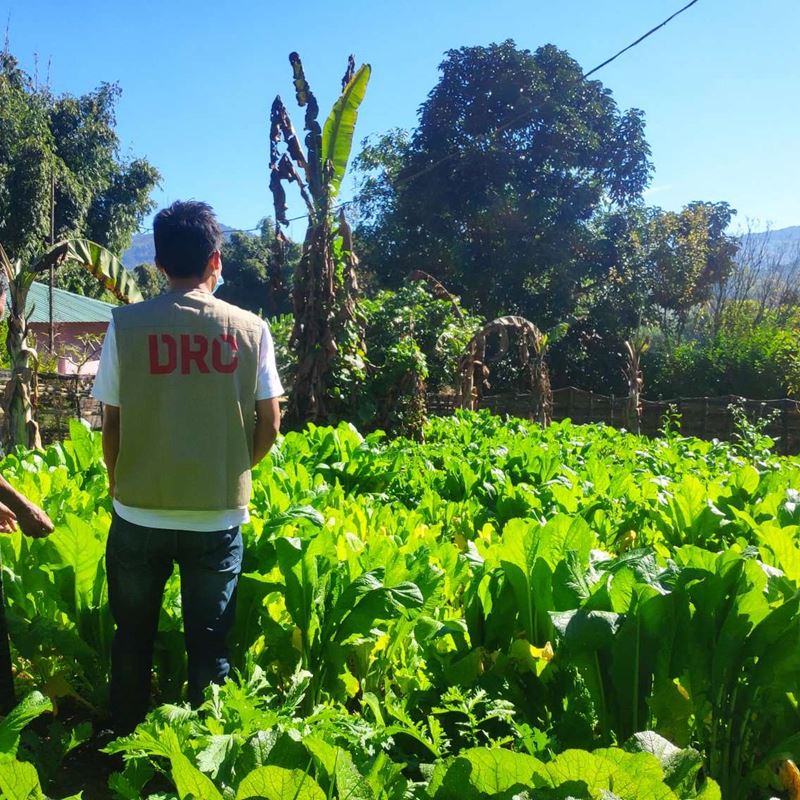Myanmar, also known as Burma, is the largest country in mainland Southeast Asia with rich natural resources – as well as over 135 ethnic groups spread across the country. Myanmar also has a long and complicated history in terms of conflict and violence between Ethnic Armed Organizations (EAOs) and the Myanmar Military, also known as the Tatmadaw.
Northern Shan State, situated along the north-eastern border close to China, has been part of this long and complicated history. This history is a reality for many people, including small hold farmers.
"We moved to this present place over nine years ago, in 2012. The whole village moved in an emergency on foot to this location, as there was heavy conflict between the military and other armed forces. There were no roads at those times in the old village, so we could only bring some important household materials with us."
U Ai Own lived in a small mountain village with his wife and mother-in-law, cultivating corn, taro and rice in their fields. They would also ferment soya-beans to sell on the market, a local favorite.
Violent conflict between the Myanmar military and armed groups were regular in the area, however when fighting came close to their village – it was decided by everyone it was too dangerous to stay. Important items were quickly collected and U Ai Own set off with his family and neighbors in search for safety. One important item they could not take with them was their land, on which new rich crops were growing.
"We could earn our income selling local products. I have never been to school, but I can speak Chinese and Myanmar languages. We thought there will be peace one day and we grew new paddies on our lands. After harvesting those paddy fields, the conflict emerged again and nearer to the villages, where we also run away from them. So we left our entire harvest paddy there."
Since that day in 2012, U Ai Own and his family have been living in Man Sar IDP Camp in Northern Shan, now including a young son of eight years and a daughter of seven years old. Things were tough in the camp at first, with waterborne diseases and diarrhea rife due to the lack of sanitation facilities. Over the years people in the camp have helped each other, alongside support from local and international humanitarian organizations to provide basic services and support.
U Ai Own works several jobs, as a day laborer harvesting sugarcane, collecting firewood, carrying cow’s manure for fertilizer, gardening and cultivating other farm crops. The work is irregular though and payment small to cover all the family expenses. The land in the camp is also not suitable for cultivation, as well as a foggy climate in the winter time – which is not ideal for continuous successful growing of crops. It is hard to earn enough cash to meet the families monthly expenses, especially including school and medical fees of his children.
In 2020 the situation deteriorated even further as the COVID-19 Pandemic swept across the globe - closing vital trading routes between Myanmar and China. In 2021, the military seizure of power, continued decline in the economy and increase in armed conflict has driven Myanmar into a deeper humanitarian crises than before. From 2021 to 2022, the number of people in need of humanitarian assistance has increased from 1 Million to 14 Million across the country.
With funding support from USAID, DRC rolled out a large Unconditional Cash Transfer Program in Kachin and Northern Shan States, to provide vulnerable families affected by displacement with a monthly unconditional injection of cash – which families can then use to meet their most immediate needs.
The cash was critical is supporting families such as U Ai Own’s be able to afford buying food, paying school fees, medical costs and other basic necessities, as cash from daily labor jobs became more scarce. This kind of cash support has been critical in Northern Shan, as strict COVID-19 rules prohibited and increased fighting restricted DRC staff from accessing people in camps directly or distributing support procured. The economic decline and border closures also made it more difficult for DRC to buy large quantities of food support or any other kind of supplies.
The cash support is a temporary support measure however for families displaced and living in the camps to survive. The conflict between the military and groups continues.
"The biggest difficulty for our family is that organizations stopped their food supplies in the past (2017). We have faced food difficulties because of supply shortage on rice, oil, salt and beans."
As much as a long-term resolution to the ongoing conflict needs to be reached, ongoing Economic Recovery and Resilience support is needed now for displaced families. DRC has been providing such support through distribution of agricultural tools, local seeds, climate smart agriculture and healthy harvesting, practices of making natural fertilizers and pesticides, as well as nutrition awareness. For DRC to continue providing such crucial support, continued financial support is required from donors such as USAID – ensuring families such as U Ai Own’s don’t fall back into food insecurity and further poverty.
